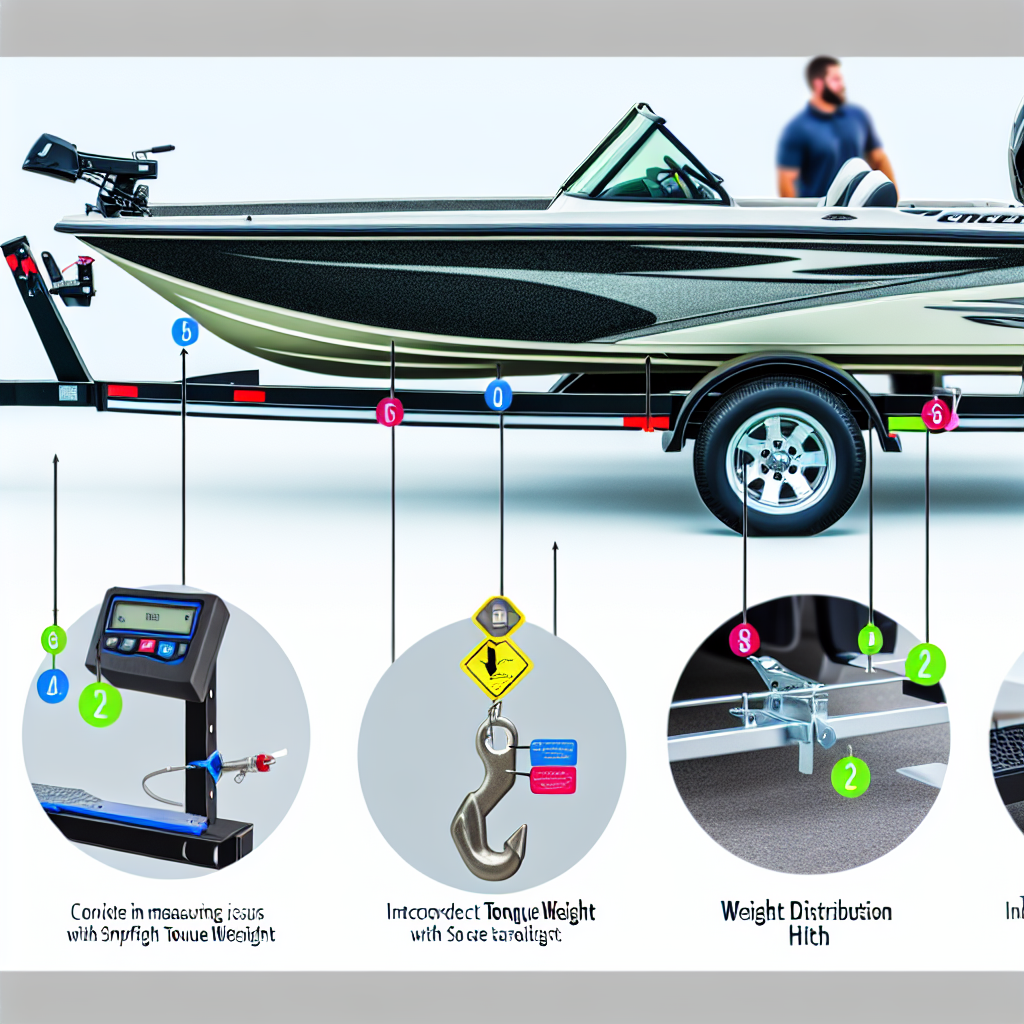Introduction to Bass Boat Trailers
As an avid angler, owning a bass boat is a prized possession. However, transporting it from one location to another requires a reliable and sturdy bass boat trailer. A bass boat trailer is essential for protecting your boat while traveling and ensuring its safety on the road. It is important to understand the ins and outs of proper bass boat trailer maintenance and safety to ensure longevity and maximum performance.
Understanding Bass Boat Trailers
A bass boat trailer is specifically designed to transport smaller and lighter fishing boats. It consists of a sturdy steel frame, a hitch, and one or two axles with wheels. A bass boat trailer is typically less expensive and easier to handle compared to larger boat trailers used for big boats and yachts. However, it still requires regular maintenance to ensure safe and reliable use.
Purpose of Tongue Weight in Boat Trailers
Bass boat trailers require a specific tongue weight to ensure proper balance between the boat and the trailer. The tongue weight is the weight that the hitch applies to the tow vehicle. A balance must be achieved to ensure stable and safe trailering. Excessive or insufficient tongue weight can lead to problems with the handling of the towed boat.
Key Takeaways:
- A bass boat trailer is a specialized trailer designed for transporting smaller fishing boats.
- Proper maintenance and safety measures should be followed to ensure maximum performance and longevity.
- Tongue weight is the weight that the hitch applies to the tow vehicle and is crucial for proper balance between the boat and trailer.
Importance of Correct Tongue Weight in Bass Boat Trailers
When it comes to safe trailering of your bass boat, having the correct tongue weight is crucial. Tongue weight is the amount of weight that is pressing down on the hitch ball of your tow vehicle.
Role of Tongue Weight in Safe Trailering
Having the correct tongue weight in your bass boat trailer is important for several reasons. One of the main reasons is safety. When your trailer has too little tongue weight, it can cause your trailer to sway or fishtail while driving, which can be dangerous.
The correct tongue weight also helps distribute the weight of your boat and trailer evenly on your tow vehicle’s axles. This even distribution of weight helps your tow vehicle to handle and stop properly, reducing wear and tear on your brakes and tires.
Potential Issues with Incorrect Tongue Weight
If your bass boat trailer has too little tongue weight, it can cause several issues. One of the most concerning is the possibility of trailer sway or fishtailing while driving. This can be caused by crosswinds, passing trucks, or uneven roads.
Too little tongue weight can also cause your tow vehicle’s front wheels to lose traction and lift off the ground, making it difficult to steer and potentially causing an accident. Additionally, too little tongue weight can cause your trailer to bounce up and down, making for an uncomfortable ride and potentially damaging your boat.
In summary, ensuring that your bass boat trailer has the correct tongue weight is essential for safe and efficient trailering. Be sure to check your tongue weight regularly and make any necessary adjustments to ensure a smooth and safe journey.
Identifying Bass Boat Trailers with Too Little Tongue Weight
Ensuring proper tongue weight is necessary to maintain trailer balance and safety. Bass boat trailers often experience insufficient tongue weight due to the boat’s position on the trailer, leading to unsafe trailering, increased tire wear and potential accidents.
Signs Your Bass Boat Trailer has Insufficient Tongue Weight
The following are clear indications of a low tongue weight:
- Heavy steering: If you experience difficulty steering your car when towing a boat, especially when trying to make tight turns, it could be a sign of insufficient tongue weight.
- Swaying or fishtailing: Without appropriate tongue weight, the boat trailer is vulnerable to sway and fish tailing, especially at high speeds.
- Poor fuel economy: The engine might work harder since there is less weight over the hitch, so fuel economy will diminish.
- Increased tire wear: Tires wear out unevenly when there isn’t enough weight toward the front of the trailer, leading to tire maintenance more frequently.
Tools for Measuring Tongue Weight
Measuring tongue weight is easy with any of the available tools available on the market. A couple of quick options include:
- Tongue Scale: Generally available at trailer supply shops, a tongue scale can measure the pressure on your trailer tongue, providing insight into the correct weight of your trailer tongue.
- Bathroom Scale: You can calculate the correct tongue weight with the help of a bathroom scale before you head out for a boating trip. Begin by positioning the Boat and Trailer on the scale and then offer support at the back using a piece of wood. This should level the trailer and return a readout that will assist you in achieving the desired tongue weight.
Once you have identified the signs of low tongue weight and measured it, you will be able to take the necessary measures to correct it.
Solutions to Improving Tongue Weight in Bass Boat Trailers
If you’ve determined that your bass boat trailer has too little tongue weight, it’s essential to correct the imbalance to ensure safe and stable trailering. Here are some solutions to improve tongue weight in bass boat trailers:
1. Adjusting Load and Position
One of the simplest solutions is to redistribute the weight on the trailer. You can do this by moving heavy items like batteries, fuel tanks, and coolers forward to increase tongue weight. Conversely, moving them towards the stern decreases tongue weight. Additionally, repositioning the boat on the trailer can also affect tongue weight. Move the boat forward on the trailer if the tongue weight is too low, moving it toward the rear if tongue weight is too high.
2. Using Weight Distribution Hitches
Another solution is to use a weight distribution hitch. This type of hitch helps to redistribute the trailer’s weight more evenly across the vehicle’s axles, which can bring the tongue weight back to an appropriate level. It also helps improve stability and reduce sway while trailering.
When selecting a weight distribution hitch, be sure to choose one rated for your trailer’s Gross Trailer Weight (GTW) and the tongue weight. It’s best to seek professional advice to ensure you select the right hitch and set it up correctly.
Precautions and Maintenance Tips for Bass Boat Trailers
Regular Checking of Tongue Weight:
Regularly checking tongue weight is essential for the safety and smooth operation of the trailer. The weight must be within the recommended limits for your boat and tow vehicle. Measure the tongue weight using a specialized scale or a bathroom scale placed under the trailer’s coupler. Check the owner’s manual for the recommended tongue weight range.
Importance of Professional Assistance for Correcting Trailer Balance:
If the tongue weight is too low, the trailer may be difficult to handle, sway or lose stability while on the road. In such scenarios, it is better to seek professional assistance to ensure the trailer is balanced and safe. Professional services may include adjusting load distribution, installing weight distribution systems, and replacement of suspension systems.
Bass Boat Trailer Maintenance Tips:
- Inspect the trailer before and after each trip. Check for signs of wear and tear on tires, brakes, lights, and frame. Deep scratches and rust must be addressed promptly.
- Keep the trailer clean, especially the rollers, bunks, and winch. Use a mild detergent and water to remove dirt, mud, and salt residue. Rinse the trailer well with freshwater.
- Store the trailer in a dry location. When storing the trailer for extended periods, ensure that it is covered and protected from the elements.
- Replace or service the bearings and seals regularly. Check the manual for the recommended frequency and procedure.
- Check the hitch, coupler and safety chains. Ensure they are secure, in good condition and comply with local towing laws.
| Bass Boat Trailer Precautions | |
|---|---|
| Observe the recommended speed limits, especially when braking and turning. | Key takeaway: Safe driving practices help prevent accidents and damage to the boat and trailer. |
| Avoid overloading the trailer, and ensure the weight is evenly distributed. | Key takeaway: Overloading can damage the trailer’s suspension system and cause instability while on the road. |
| Ensure the boat is correctly positioned on the trailer. Adjust the bunks, rollers, and winch to hold the bow and stern firmly in place. | Key takeaway: Proper boat positioning helps maintain balance and stability while towing. |
| Use proper tie-downs and straps to secure the boat to the trailer. Check them regularly during transportation, especially after a period of rough road. | Key takeaway: Proper tie-downs provide extra support and stability to the boat while in transit. |
FAQs
Q. How do I determine the correct tongue weight for my bass boat trailer?
A. The correct tongue weight for your bass boat trailer depends on various factors, including the gross weight of the boat and the tow vehicle, the hitch type, and the tongue weight capacity of the trailer. Check the owner’s manual for the recommended tongue weight range, or consult a professional trailer service provider to determine the appropriate weight.
Q. Can I use a regular scale to measure my trailer’s tongue weight?
A. While a regular scale may give you an indication of the tongue weight, it is better to use specialized scales designed for measuring trailer tongue weight. These scales are more accurate and provide a more reliable reading.
Q. How often should I replace my trailer bearings and seals?
A. Trailer bearings and seals should be replaced or serviced regularly. Check the owner’s manual for the recommended frequency, or consult a trailer service provider for the appropriate schedule. It is also essential to inspect the bearings and seals regularly for any signs of wear and tear.


